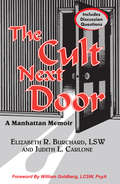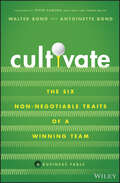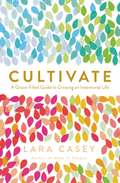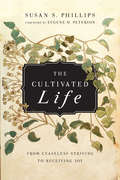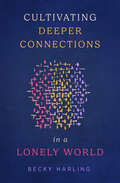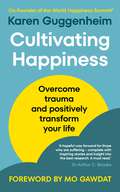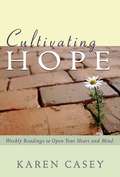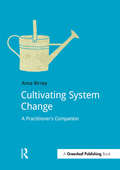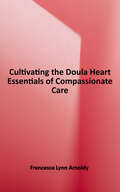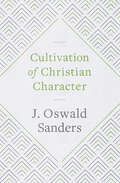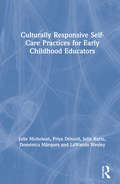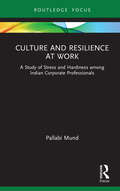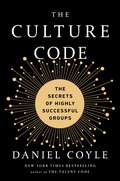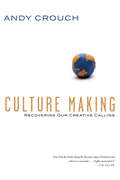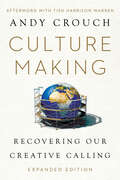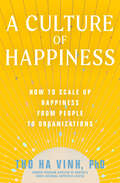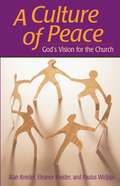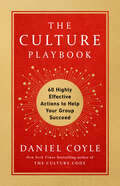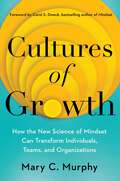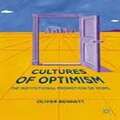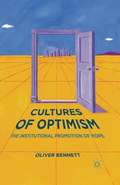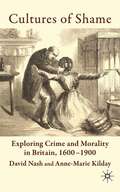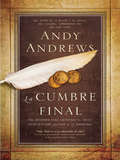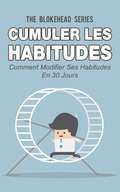- Table View
- List View
The Cult Next Door: A True Story of a Suburban Manhattan New Age Cult
by Elizabeth Burchard Judith Carlone William GoldbergDuring Thanksgiving vacation of her freshman year at Swarthmore College (1977), Elizabeth, at her mother's insistence, attended a "stress-reduction" session with a biofeedback technician on staff at a Manhattan psychologist's office. During that first visit, this man filled her ears with prophetic visions of a glorious future--the inheritance of those fortunate few who might choose to accompany him. His confidence and charisma entranced her, and she soon recruited two of her college roommates. When the psychologist fired his assistant two years later, Elizabeth and her mother followed. Over the next decade, this man, a malevolent genius and master of manipulating metaphysical concepts to benefit a self-serving agenda, organized a small, dedicated band of followers. "The Group" evolved into an incestuous family--a cult. Their brainwashed minds became fused with a distinctive, New Age doctrine. A coterie of spiritual "Navy Seals", they scrambled in terror, training to survive the inevitable cataclysm--one man's divine vision of Armageddon. Subsequent to a momentous event in August 1994, with the guru as high priest, "The Black Dog Religion" was born. Elizabeth sank into a pit of despair, darker than she ever could have imagined was possible. From the adolescent gullibility which seduced her astray, to the enlightenment which led her to freedom, you will travel an incredible journey. For anyone who has ever been trapped by a person who would not let them go, within this book lies a message of hope.
Cultivate: The Six Non-Negotiable Traits of a Winning Team
by Walter Bond Antoinette BondRecruit, develop, and retain a high-performing team Cultivate: The Six Non-Negotiable Traits of a Winning Team is a robust and empowering narrative about three corporate team leaders discovering how to build a high-performing team. Over the course of the story, you’ll follow these frustrated leaders as they take an introspective look into their own flaws, strengths, fears, habits, and shortcomings and learn firsthand how they impact their teams’ cultures. The authors demonstrate how leaders build the cultures they work in and explain why it’s up to them to manage and improve it. The book is packed with tried-and-true teamwork fundamentals that are simple to understand and apply. Readers will also find: Explanations of why companies are struggling to recruit, develop, and retain strong teams Practical and applicable tips for employee and team member retention Explorations of the six traits of high-performing teams that are the signature of all elite business unitsA can’t-miss journey through the fundamentals of recruiting, building, and maintaining a high-performing team in your own organization, Cultivate will earn a place in the libraries of executives, managers, and other business leaders struggling to adapt to the human resources and retention challenges posed by the new economy. In business, Winning, Losing, or Championship organizations are totally dependent on a leader’s ability to CULTIVATE!
Cultivate: A Grace-Filled Guide to Growing an Intentional Life
by Lara CaseyA flourishing life is possible—no perfection required!Women often feel like they have to have it all together in order to live a meaningful life. Instead they feel inadequate, overwhelmed, and exhausted as they to figure out how to do it all. Author, business owner, and mom to three Lara Casey offers sound and grace-filled advice: “We can’t do it all, and do it well. But, we can choose to cultivate what matters.”Welcome to the journey of getting messy in the rich soil of possibility—embracing imperfect, grace-filled progress to grow a life of joy.Written as part encouragement anthem and part practical guide, Cultivate offers wisdom from God’s Word alongside lessons Lara has learned in her garden. Woven throughout is her personal story that helps release readers from the pressure to achieve and gives them freedom to move from planning to planting a meaningful legacy. “It’s in the imperfect—the mess of the dirt--that good things grow,” Casey reminds readers. “Peonies grow through the dirt, and so do we.” Readers will learn to embrace the season they’re in, finding balance as they interact in fresh ways with their current life scenarios, with God, and in the communities where they are planted.Special features includeActionable Cultivate It prompts throughout the bookA ten-week Cultivate Together discussion guide with questions for small groups“Grace from the Garden” vignettes provide encouragement and inspirationFind the joy and the freedom that comes in cultivating what matters, little by little, with God’s transforming grace.
The Cultivated Life: From Ceaseless Striving to Receiving Joy
by Susan S. PhillipsDallas Willard Center 2016 Book and Research Award FinalistHearts Minds Bookstore's Best Books of 2015, Spirituality and the Devotional LifeThe Cultivated Life.
Cultivating Deeper Connections in a Lonely World
by Becky HarlingLoneliness is an epidemic, but you can live life with a deep sense of belonging.If you&’ve ever felt that ache to connect and belong, you&’re not alone: three out of every five people are suffering from loneliness. No group is excluded—married, unmarried, parents, pastors, leaders, elderly, and teenagers. We all experience moments . . . or long seasons of heart-aching loneliness. And it hurts. It can hurt right to the core.In Cultivating Deeper Connections in a Lonely World, relationship expert, mother, grandmother, and John Maxwell Certified Coach Becky Harling taps into the deep ache of loneliness and shares with readers a rich theology of belonging. Does God ache for us? What does it mean that we belong to Him? How do we establish a deeply bonded relationship with others? What steps can we take to improve our relationships?Because we were made for God and for community, relational isolation or brokenness is incredibly painful. But we don&’t have to live isolated and unconnected. In fact, we must not. Our souls were designed for more. Deeply rooted in Scripture and joined with reflection questions, this book shows us how we can strengthen our relationships and experience deep connection.
Cultivating Happiness: Overcome trauma and positively transform your life
by Karen GuggenheimIs it possible to overcome pain by learning to be happy?This is the question Karen Guggenheim asked herself after the sudden death of her husband in 2013. Overwhelmed by this unexpected loss, Karen decided to use her grief as a motivator to look inwards and embark on a transformative journey of post-traumatic growth, which led her to become the co-founder of the World Happiness Summit, the leading happiness conference in the world.Drawing from her personal experiences and research in psychology and neuroscience, Karen reveals that happiness can be taught and learned, and that, through small daily changes, we can all bring more compassion and positivity into our days to feel better about ourselves and others.Cultivating Happiness is a practical and accessible guide to dealing with adversity, showing us that it is possible to grow from our challenges and lead more fulfilling and purposeful lives.
Cultivating Hope: Weekly Readings to Open Your Heart and Mind
by Karen CaseyBest-selling author Karen Casey offers a year-long program to guide us in opening ourselves to the awesome power of hope."Cultivating Hope is a book that will be read and reread. Karen Casey touches that space in all of us that occasionally struggles to breathe more easily, to hope more assuredly." --Marianne Williamson, best-selling author of A Return to Love Best-selling author Karen Casey offers a yearlong program to guide us in opening ourselves to the awesome power of hope.It is hope--the ability to push past fear and open our minds to new possibilities--that empowers us to bring about positive change in our lives. Yet, amid personal tragedy and world events, many of us struggle to sustain a sense of hope for tomorrow.In Cultivating Hope, spiritual leader and recovery expert Karen Casey reveals everyday ways that we can open our hearts and minds to the awesome power of hope. For each week of the year, she offers a guiding principle with an accompanying essay that can help each of us achieve inner peace. Themes include healing through the expression of love, gaining a fresh outlook by understanding our anger, and freeing ourselves of constraint by letting go of judgment.By allowing Casey's principles, insights, and personal stories to penetrate our thoughts and inform our habits, we gain the perspective and strength to turn away from fear and open ourselves and our communities to a future filled with potential and positive change.
Cultivating System Change: A Practitioner’s Companion (Doshorts Ser.)
by Anna BirneyWhere should you start if you are faced with massive systemic challenges or want to cultivate a shift towards sustainability in global systems? Where are the leverage points for systemic change? This book provides examples of what organizations and companies like the Sustainable Shipping Initiative, WWF and Nike are doing, along with practical strategies and an overview of system change theory. Section one outlines systems thinking, especially how we can use a "living systems" perspective as a tool to understanding sustainability and change.Section two pulls out practical strategies for action from theoretical models and "must-read" literature. Section three illustrates how organisations are implementing these strategies – including examples from the Sustainable Shipping Initiative, Nike, Sustainable Food Lab, Finance Innovation Lab, Shell Foundation and Rockefeller Foundation.Section four provides tips for you as a practitioner navigating this territory. Many of the ideas behind cultivating system change can be difficult to understand until they are put into practice. This "practitioner's companion" ends with questions that will prompt reflections and spur you to action. Keep it to hand as you change the system!
Cultivating the Doula Heart: Essentials of Compassionate Care
by Francesca Lynn ArnoldyPart how-to guide, part hopeful manifesto, Cultivating the Doula Heart provides a clear framework for supporting those facing hardship, grief, and loss. Succinct and straightforward, this "work of heart" covers Components of Doula Care, Aspects of Loss, Ways of Being/Ways of Doing Grief Support, and Contemplative Exercises. This read is a beacon of light for difficult realms, allowing us all to practice and hone our ability to move from sympathy to empathy to compassion.
Cultivation of Christian Character
by J. Oswald SandersA Lost Book from J. Oswald Sanders Now Re-Released with a Beautiful New Cover"Many true lovers of the Lord are beset with a sense of inadequacy and failure in living the Christian life as it ought to be lived. … they yearn to know Christ better and serve Him more worthily. It is to such that this little volume is addressed."-J. Oswald Sanders, from the introductionJ. Oswald Sanders (best known for his book Spiritual Leadership, which has sold over a million copies) touched hundreds of thousands of lives in his lifetime and continues to inspire Christians today. His books Spiritual Leadership, Spiritual Maturity, and The Incomparable Christ are beloved and well-read to this day. But there are two of his books that readers haven&’t had access to in over 30 years. Cultivation of Christian Character is one of them. It&’s a profound and challenging book for anyone who earnestly wants to know God more. Sanders teaches you about spiritual struggle, the healing power of Scripture, and how to fight spiritual warfare victoriously. But most of all he shows you how to give up your self-focus and take up a Christ-focus. Any Christian who wants to grow will surely be benefited by this book.
Cultivation of Christian Character
by J. Oswald SandersA Lost Book from J. Oswald Sanders Now Re-Released with a Beautiful New Cover"Many true lovers of the Lord are beset with a sense of inadequacy and failure in living the Christian life as it ought to be lived. … they yearn to know Christ better and serve Him more worthily. It is to such that this little volume is addressed."-J. Oswald Sanders, from the introductionJ. Oswald Sanders (best known for his book Spiritual Leadership, which has sold over a million copies) touched hundreds of thousands of lives in his lifetime and continues to inspire Christians today. His books Spiritual Leadership, Spiritual Maturity, and The Incomparable Christ are beloved and well-read to this day. But there are two of his books that readers haven&’t had access to in over 30 years. Cultivation of Christian Character is one of them. It&’s a profound and challenging book for anyone who earnestly wants to know God more. Sanders teaches you about spiritual struggle, the healing power of Scripture, and how to fight spiritual warfare victoriously. But most of all he shows you how to give up your self-focus and take up a Christ-focus. Any Christian who wants to grow will surely be benefited by this book.
Culturally Responsive Self-Care Practices for Early Childhood Educators
by Julie Nicholson Julie Kurtz Priya Shimpi Driscoll Doménica Márquez LaWanda WesleyThe first self-care book designed specifically for the early childhood field, Culturally Responsive Self-Care Practices for Early Childhood Educators is filled with helpful strategies and tools that you can implement immediately. Recognizing that self-care is not one size fits all, the authors present culturally responsive strategies drawn from diverse early childhood staff working in a range of roles across communities and contexts. By tying the importance of educator self-care to goals of social justice and equity, this book advocates for increased awareness of the importance of self-care on both an individual and institutional level. Through key research findings, effective strategies and personal anecdotes, this accessible guide helps readers understand and engage with the critical role self-care and wellness-oriented practices play in creating strong foundations for high quality early learning programs.
Culture and Resilience at Work: A Study of Stress and Hardiness among Indian Corporate Professionals (Routledge Focus on Business and Management)
by Pallabi MundIn 1979, Suzanne C. Kobasa propounded her theory of "hardiness" where she hypothesized her 3Cs: Commitment, Control, and Challenge, as the basic ingredients of hardiness that make an individual stress resilient. She was one of the early researchers who paid attention to personality features and illustrated that individuals who experience high level of stress without mental and physical illness have a different personality from those who become ill in stressful conditions. In current times, the discourse has enjoyed a sustained scholarly interest but there is hardly any study on the corporate professionals or the Indian context. Since the early 1990s, India has joined the corporate world and has been a fast-developing country. This changed state of affairs provides a broader scope of study on hardy personality in coping with stress in the Indian context. This book examines the efficacy of hardiness on the Indian corporate professionals in the post-globalization scenario. It endeavours to situate Kobasa’s foundational theorisation along with those offered by other scholars in the context of the contemporary life situations with a focus on India. It presents a hypothesis that in the Indian context, culture could be looked upon as yet another basic component of hardiness. Culture and Resilience at Work offers an assessment of the significant contribution of Indian culture as one of the major contributing components in enhancing hardiness in corporate professionals. It will be of interest to researchers, academics, professionals, and students in the fields of stress management, human resource management, social psychology, culture studies, and organizational behaviour.
The Culture Code: The Secrets of Highly Successful Groups
by Daniel CoyleThe New York Times bestselling author of The Talent Code unlocks the secrets of highly successful groups and provides tomorrow’s leaders with the tools to build a cohesive, motivated culture. Where does great culture come from? How do you build and sustain it in your group, or strengthen a culture that needs fixing? In The Culture Code, Daniel Coyle goes inside some of the world’s most successful organizations—including the U.S. Navy’s SEAL Team Six, IDEO, and the San Antonio Spurs—and reveals what makes them tick. He demystifies the culture-building process by identifying three key skills that generate cohesion and cooperation, and explains how diverse groups learn to function with a single mind. Drawing on examples that range from Internet retailer Zappos to the comedy troupe Upright Citizens Brigade to a daring gang of jewel thieves, Coyle offers specific strategies that trigger learning, spark collaboration, build trust, and drive positive change. Coyle unearths helpful stories of failure that illustrate what not to do, troubleshoots common pitfalls, and shares advice about reforming a toxic culture. Combining leading-edge science, on-the-ground insights from world-class leaders, and practical ideas for action, The Culture Code offers a roadmap for creating an environment where innovation flourishes, problems get solved, and expectations are exceeded. Culture is not something you are—it’s something you do. The Culture Code puts the power in your hands. No matter the size of your group or your goal, this book can teach you the principles of cultural chemistry that transform individuals into teams that can accomplish amazing things together.Advance praise for The Culture Code “I’ve been waiting years for someone to write this book—I’ve built it up in my mind into something extraordinary. But it is even better than I imagined. Daniel Coyle has produced a truly brilliant, mesmerizing read that demystifies the magic of great groups. It blows all other books on culture right out of the water.”—Adam Grant, New York Times bestselling author of Option B, Originals, and Give and Take “If you want to understand how successful groups work—the signals they transmit, the language they speak, the cues that foster creativity—you won’t find a more essential guide than The Culture Code.”—Charles Duhigg, New York Times bestselling author of The Power of Habit and Smarter Faster Better
Culture Making: Recovering Our Creative Calling
by Andy CrouchChristianity Today Book Award winner Publishers Weekly's best books The only way to change culture is to create culture. Most of the time, we just consume or copy culture. But that is not enough. We must also do more than condemn or critique it. The only way to change it is to create it. For too long, Christians have had an insufficient view of culture and have waged misguided "culture wars." But Andy Crouch says we must reclaim the cultural mandate to be the creative cultivators God designed us to be. Culture is what we make of the world, both in making cultural artifacts as well as in making sense of the world around us. In this expanded edition of his award-winning book Crouch unpacks the complexities of how culture works, the dynamics of cultural change, and tools for cultivating culture. Keen biblical exposition demonstrates that creating culture is central to the whole scriptural narrative, the ministry of Jesus, and the call to the church. With a conversation between Crouch and Tish Harrison Warren as the new afterword, this expanded edition addresses the current landscape and forges a way for the future of culture making. Enter into it with guided questions for reflection and discussion for a deeper experience.
A Culture of Happiness: How to Scale Up Happiness from People to Organizations
by Tho Ha VinhPractical principles for creating conditions for happiness at scale from the program director of the Gross National Happiness Center of Bhutan, the only country in the world to measure progress by the happiness of its citizens.Despite countless happiness programs focused on individual well-being, are we any happier, really? Is it in fact possible to be fully happy within a miserably dysfunctional society built to keep structures of inequity in place? Possible, perhaps, but not easy. While the pursuit of happiness is a much-celebrated ideal, how can countries and communities design the right environments for people to lead happy lives? Personal programs for happiness that include mindfulness, empathy, and gratitude are a good start, but without structural changes, they can only go so far. Taking the case of the country of Bhutan as an example, the nation's first Gross National Happiness program director Tho Ha Vinh explains how the principles of happiness can and must apply to people, families, and communities at scale to produce the conditions for a truly satisfying life. More and more people feel that we live in a time of transition and that our very survival on this planet depends on renewing the way we live together in society. Gross National Happiness is an innovative development paradigm that puts the interconnected happiness of all people and the well-being of all life forms at the center of progress. Based on real-life experiences, this book shows a multitude of practical methods for strategic thinkers and change makers to apply the framework of Gross National Happiness to bring about positive change in schools, businesses, and communities.
Culture of Peace: God's Vision For The Church
by Alan KreiderWhy is peace such a divisive issue, even among Christians? Why is it so hard to practice right here right now? Why is peace often considered an extra, rather than an essential, to faithful Christian living? The three authors decided to write this book when the Indonesian member of the team remarked to the other two: "If the Christian church is to make any impact on Indonesia, it must address itself to the biggest peace issue -- reconciliation with Muslims." But before the writers could honestly consider that explosive possibility, they first had to ask why Christians find it so difficult to live peaceably with other Christians. They've discovered that conflict is often a prerequisite of peace. They grant that peace is a continuum -- easier to live in some areas of life than in others. They've learned that peace has two parents -- hard work and grace. Living in peace is muscular activity. The authors suggest how to develop "peacemaking reflexes"; how churches "can learn to handle conflict well"; and how to cultivate vulnerability and humility, two essential "attitudes of peacemakers." True stories from communities around the world support this hopeful but strenuous call to faithful living.
The Culture Playbook: 60 Highly Effective Actions to Help Your Group Succeed
by Daniel CoyleThe ultimate handbook for fostering and cultivating a strong team culture, from the New York Times bestselling author of The Culture Code and The Talent Code.&“If you are a leader—or if you work with one—and want to understand how to build psychological safety, trust, and a sense of purpose for your team, then you need this book.&”—Charles Duhigg, author of The Power of HabitBuilding a team has never been harder than it is right now. How do you create connection and trust? How do you stay focused on your goals? In his years studying the ways successful groups work together, Daniel Coyle has spent time with elite teams around the world, observing the ways they support each other, manage conflict, and move toward a common goal. In The Culture Playbook, he distills everything he has learned into sixty concrete, actionable tips and exercises that will help your team build a cohesive, positive culture. Great cultures, Coyle has found, are built on three essential skills: safety, vulnerability, and purpose. Within this framework, he shows us how we can better serve our teammates, ourselves, and our shared purpose, including:• scheduling regular team &“tune-ups&” to place an explicit spotlight on the team&’s inner workings and create conversations that surface and improve team dynamics• creating spaces for remote coworkers to connect with their colleagues to foster a team spirit even across distances • holding an anxiety party to serve as a pressure-relief valve, as well as a platform for people to connect and solve problems together With reflections, exercises, and practical tips that will prove invaluable to companies, athletes, and families alike, and replete with black-and-white illustrations, The Culture Playbook is an indispensable guide to ensuring that your team performs at its best.
Cultures of Growth: How the New Science of Mindset Can Transform Individuals, Teams, and Organizations
by Mary C. MurphyAward-winning social psychologist Mary Murphy offers a groundbreaking reconsideration of individual and team success—showing how to create and sustain a growth mindset in any organization&’s culture.Carol Dweck&’s multi-million-copy bestseller Mindset transformed our view of individual potential, coining the terms &“fixed&” and &“growth&” mindset: in a &“fixed&” mindset, talent and intelligence are viewed as predetermined traits, while in a &“growth&” mindset, talent and intelligence can be nurtured. In Cultures of Growth, Dweck&’s protégé, Mary Murphy, a social psychologist at both Stanford and Indiana University, shows that mindset transcends individuals. A growth mindset culture can transform any group, team, or classroom to reach breakthroughs while also helping each person achieve their potential. Murphy&’s original decade-long research reveals that organizations and teams more geared toward growth inspire deeper learning, spark collaboration, spur innovation, and build trust necessary for risk-taking and inclusion. They are also less likely to cheat, cut corners, or steal each other&’s ideas. And they&’re more likely to achieve top results. In these cultures, great ideas come from people from all backgrounds and at all levels—not just those anointed as brilliant or talented. Discover how a culture of growth helped make outdoor retailer Patagonia a leader in its field; how Satya Nadella transformed Microsoft; how winemakers Robin McBride and Andréa McBride John are leading with a mindset to disrupt and diversify the entire wine industry; and how a New York school superintendent reversed massive inequities for children of color by reshaping the district&’s mindset culture. Drawing on compelling examples from her work with Fortune 500 companies, startups, and schools, Murphy demonstrates that an organization&’s mindset culture is the key to success for individuals, teams, and the entire organization, teaching you how to create and sustain a culture of growth no matter your role. Create environments where people want to be, where everyone can thrive and achieve their potential, both individually and together. In a world where success seems reserved for a chosen few, Cultures of Growth unveils a radically different approach to creating organizations that inspire learning, growth, and success at all levels.
Cultures of Optimism
by Oliver BennettIn the context of widespread intellectual pessimism, this book explores how individuals and societies sustain hope. It focuses, in particular, on the active role played by powerful institutions in the propagation of optimism. The cultures they promote offer visions of the future, which nurture hope and meaning, and exercise strong influences on how people act in the present. Yet these processes often go unobserved. In this sequel to his acclaimed book on cultural pessimism, Oliver Bennett examines the institutional promotion of optimism in five different domains: democratic politics; work; the family; religion; and psychotherapy. In doing so, Bennett addresses a number of questions: what are the functions of optimism in modern societies? How and why do institutions promote it? What values and attitudes are involved? Drawing on a range of disciplines, including social and evolutionary psychology, intellectual history and organisational behaviour, this book throws new light on an important but neglected aspect of modern culture.
Cultures of Optimism: The Institutional Promotion Of Hope
by Oliver BennettWhat are the functions of optimism in modern societies? How is hope culturally transmitted? What values and attitudes does it reflect? This book explores how and why powerful institutions propagate 'cultures of optimism' in different domains, such as politics, work, the family, religion and psychotherapy.
Cultures of Shame
by David Nash Anne-Marie KildayThe first systematic study of the concept of shame from 1600-1900, showing good and bad behaviour, morality and perceptions of crime in British society at large. Single episodes in the history of shame are contextualized by discussing the historiography and theory of shame and their implications for the history of crime and social relations.
La cumbre final
by Andy AndrewsDavid Ponder está de vuelta. Esta vez, el destino de la Humanidad está en sus manos. Esta es la última oportunidad de la humanidad. Siglos de ambición, orgullo y odio han lanzado a la humanidad al desastre, y la han alejado de su propósito original. Sólo existe una solución para reposicionar la brújula y volver el navío a su curso, y consiste de dos palabras. El tiempo se acaba y depende de David Ponder y de un reparto de las mejores y más brillantes mentes de la historia hallar la solución antes de que sea demasiado tarde. ¿El problema? Solo tienen cinco oportunidades para encontrar la respuesta. Los lectores se encontraron con David Ponder en El regalo del viajero. Ahora, en La cumbre final, Andrews combina una narrativa fascinante con una asombrosa historia para mostrarnos la única cosa que debemos hacer cuando no sabemos qué hacer.
Cumuler les habitudes Comment modifier ses habitudes en 30 jours
by The BlokeheadL'accumulation d'habitudes est, par définition, la création d'une nouvelle habitude de vie en « empilant » la nouvelle habitude par dessus une autre qui existe déjà. Voyez-vous, les habitudes que nous adoptons de façon régulière disposent d'un système d'enracinement puissant en nous. En commençant à établir une nouvelle habitude sur une base existante puissante, dans ce cas-ci une autre habitude, vous partez avec le plus gros du travail déjà réalisé. Il n'y a aucune raison de commencer à développer une nouvelle habitude à partir de zéro. Le principe d'accumulation d'habitudes est assez simple. Lisez donc la suite.
